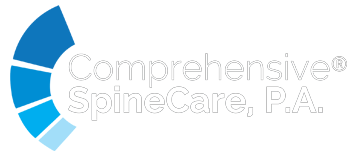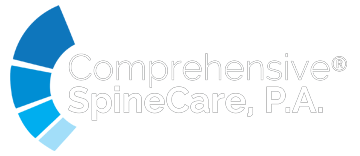As recently as 2019, 39.0% of adults experienced back pain. There are several disorders that are more common–and possibly unique–in women. Problems associated with back pain typically appear in the postmenopausal age, or approximately the age of 50+ years. Continue reading to learn more about the most common causes of back pain in women in this guide from Comprehensive Spine Care.
Piriformis Syndrome
Pain caused by spasms of the piriformis muscle (a large muscle located deep in the hips) is called piriformis syndrome. Women are more susceptible to this condition due to hormone and pregnancy-related changes. Piriformis syndrome often irritates or compresses the sciatic nerve, similar to sciatica. Piriformis syndrome can cause:
- Chronic hip pain exacerbated by hip movement
- Pain when getting up
- Inability to sit for long periods of time
- Radiating pain in the thigh and back of the leg
Sacroiliac Joint Dysfunction
Sacroiliac joint dysfunction, or sacroiliitis, is a type of pain in the SI joints that connect the spine to the pelvis. Women are more prone to SI joint issues due to their narrower joint area and wider, less curved, and more backward-sloping sacrum than men. Dysfunction of the sciatic joint can also cause symptoms similar to sciatica. Common features are:
- Low back pain
- Dull or sore pain above the buttocks that occasionally turns into a stabbing pain
- Sharp, stabbing or shooting pain in the lower thigh that usually does not go beyond the knee
- Severe pain usually increases when sitting, lying on the affected side, and/or climbing stairs
Osteoarthritis Of The Spine
Degenerative arthritis (osteoarthritis) of the facet joints (the joints that connect the vertebrae) is common in women. Osteoarthritis of the spine causes the fibrocartilage in the facet joints to break down. Without the cushioning provided by cartilage, your bones would rub against each other and cause pain. People that are older and overweight have a higher risk of developing this condition. People that are older and overweight have a higher risk of developing this condition. Osteoarthritis in the lower back can cause:
- Pain in the upper or lower back, groin, buttocks, and thighs
- Back stiffness and pain in the morning
- Occasional episodes of severe pain
- Pain may be on one side of the back, worsened when external pressure is applied, and/or relieved by bending the spine forward
Degenerative Spondylolisthesis
When a vertebra in the spine degenerates and slips past the vertebrae below it, it is called degenerative spondylolisthesis. This condition is more common in postmenopausal women due to lower estrogen levels. When estrogen levels are low, the intervertebral discs deteriorate and the ligaments that hold the vertebrae together loosen causing spinal instability. People in this age group are also more likely to develop spinal osteoarthritis, which increases the risk of spondylolisthesis. Degenerative spondylolisthesis can cause:
- Back pain with radiating pain in the legs
- Neurogenic claudication (pain while walking) when the spinal cord is compressed
- Pain relief usually occurs when bending forward
Coccyx Pain
Pain in the back of the spine (tailbone) is mainly due to trauma. It is more common in women due to differences in the shape and angle of the pelvis and injuries during childbirth. The tailbone provides support while sitting. Injuries to this area cause pain, while:
- Leaning back when sitting down
- Sitting on a hard surface
- Standing up from a sitting position
As soon as you stand up, the tailbone pain suddenly subsides. Patients with this condition may prefer to sit forward or lean on one hip at a time to avoid tailbone pain.
Endometriosis
Endometriosis is a gynecological condition that only affects women. This condition causes uterine tissue to grow outside the uterus. Typical symptoms are:
- Painful menstrual cycles with severe pelvic and lower abdominal pain
- Pain in the genital area
- Back pain, especially during menstruation
- Pelvic and/or back pain that becomes chronic and flares up during menstruation
Osteoporotic Spine Fractures
Osteoporosis occurs when your bones become less dense, making them brittle and prone to breakage. This condition happens because the rate of bone loss is higher compared to new bone formation. Postmenopausal women are four times more likely than men to develop osteoporosis. This difference may be due to a lack of estrogen, bone loss at a younger age, and a faster rate of bone loss.
Osteoporosis itself causes bone pain, but more commonly it causes spinal compression fractures that lead to acute back pain. Spinal compression fractures can cause:
- Acute localized back pain, usually in the middle back or the area between the middle and lower back
- Pain that spreads forward and may be mistaken for a heart or lung problem.
Depending on its severity, this condition could become a medical emergency.
Other Causes Of Back Pain In Women
Women can also experience back pain for no evident reason. Typical changes in a woman’s life cycle, including pregnancy, childbirth, hormonal imbalances, and weight gain (especially in the abdomen), can set off a chain of events that leads to back pain.
When Should I See A Doctor?
See your doctor if your back pain doesn’t go away with self-treatment or interferes with your daily functioning. A doctor can help identify and treat the cause of back pain. A trained physician can also recommend necessary lifestyle changes such as an anti-inflammatory diet and structured exercise routine.
Comprehensive Spine Care, established in 1996, is one of the most knowledgeable spine clinics in Bergen County, New Jersey. Our team is comprised of board-certified orthopedic spine surgeons with expertise in all aspects of spine care. We believe that most spinal conditions can be cured without surgery. Comprehensive rehabilitation plays an important role in our non-surgical treatment of most spinal conditions. Surgery may be recommended when all nonsurgical treatment options have failed to relieve pain in our patients and their quality of life is affected. Call 201-634-1811 today to book a consultation.










